Mar 29, 2018
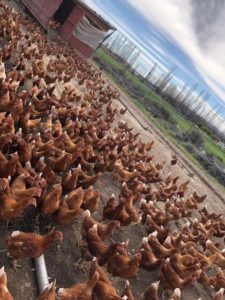
By Elena Karoulina, Executive Director
It’s a crisp, breezy morning in March, and I am walking the fields of the Eatwell Farm with the farm manager, Cameron Ottens. It’s a fascinating place – I fell under its spell from the first minutes I saw the earth-sheltered farmhouse with a living green roof and walls.
Many fields are planted with cover crop, nurturing soil, getting ready for the busy summer season. Multi-colored chard, kale and many sorts of cabbages fill the rest of the fields that look like an impressionist painting, with all shades of green and some bright accent colors. Chickens are housed in the mobile coops; they are regularly moved to different locations throughout the farm leaving behind cleaned and fertilized areas. Fruit trees in the nearby orchard are beginning to flower, showing off a pastel-hued rainbow of petals against blue spring sky.
As I am listening to Cameron talking about soil, farm operation, plants, CSA, sustainable farming, local food system, I am reminded again and again about the complexity of the art we call agriculture. Cameron often exclaims: “There is so much to learn!”. The work and learning in the farm are endless….
Eatwell farm was founded by the late Nigel Walker, a leading figure in the Bay Area organic food movement. Beginning with 65 acres near Dixon in 1997, the farm has grown to 105, all organic acres growing hundreds of varieties of fruits and vegetables to ensure a year-round, diverse supply of the best produce for their Community Supported Agriculture (CSA) members. Each weekly box comes with recipes and a newsletter from the farm.
CSA members are often invited to the farm for the members-only events like Strawberry Days (You Pick Them), Lavender Harvest and Summer Solstice. You can even have a sleepover on the farm!
There are numerous CSA pick-up locations throughout the Bay Area, including Vallejo, Fairfield and Vacaville in Solano County. There is a waiting list for Benicia too – if you are interested, please contact the farm!
What makes this farm so special is their Care Share Program. Eatwell Farm provides boxes of fresh, organic produce to people who are truly in need of super nutrition, including community members undergoing intense medical treatment. One of the Sustainable Solano partners, Mission Solano, a transitional house for homeless people of Solano County, receives boxes of fresh produce weekly from this generous program.
Just like every holistic, family-owned farm serving local communities, this farm needs all the support from us! Please consider joining Eatwell Community Supported Agriculture program. You will be rewarded by a weekly box of fresh, nutrient-dense organic produce and eggs. To find out more and to sign up: https://www.eatwell.com
P.S. If you would like to hear the founder, Nigel Walker, talk about his farming philosophy beginning with healthy soils – the approach that is still the foundation stone of the farm – watch this video:
https://www.youtube.com/watch?v=oa9ORY_VXKg
Cameron Ottens, Eatwell Farm manager, will be a part of the post-movie panel discussion, “The Economics of Happiness”, showing in Vallejo on Saturday, March 31 (link). Hope to see you there!
Mar 27, 2018
By Stephanie Oelsligle Jordan, Local Food Project Manager
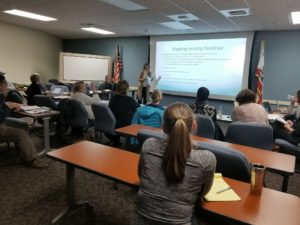 Sustainable Solano is nearing completion of Phase 1 of its “Solano Community Food Centers” project, funded by a USDA Local Food Promotion Program planning grant. The Food Centers are intended to be small-scale, consumer-driven food hubs (including both processed food and raw ingredients), sourced by local farmers, and located in each of Solano County’s seven cities.
Sustainable Solano is nearing completion of Phase 1 of its “Solano Community Food Centers” project, funded by a USDA Local Food Promotion Program planning grant. The Food Centers are intended to be small-scale, consumer-driven food hubs (including both processed food and raw ingredients), sourced by local farmers, and located in each of Solano County’s seven cities.
In Phase 1, we began conducting a feasibility study to determine the supply of local food in the county, the demand for local food among consumers, and explore ways to distribute this food to the people who want/need it. The project’s Working Group also analyzed past studies and literature relevant to the project, and began connecting with other regional organizations who are doing similar work in the areas of food systems and sustainability. The project’s Advisory Board met on Thursday, March 1, 2018, where findings to date were presented by the Working Group.
What we have found is that Solano County has a wealth of agriculture, but no organized “local food system.” Before we get into the findings and data, let’s define what a “local food system” is, within the context of this project. By “local”, we mean food that is both produced and consumed within Solano County. A functioning “food system” would refer to farms and ranches earning income through either direct-to-consumer sales, or intermediary marketing channels like schools, grocers, food hubs and the like. Furthermore, the system as a whole would strengthen Solano County’s rural economy and the environment while at the same time providing access to food (regardless of income/economic status), and nutrition education.
Data from 2015 shows that farm production in Solano County is around $354 million, and Solano County products are exported to 44 countries. Agriculture creates 4,709 jobs in the County, which accounts for 1.1% of the population. A 2017 study titled “Economic Effect of Agriculture in Solano County” confirmed that Solano has a thriving food manufacturing industry but nearly all of its raw materials come from elsewhere, and most raw agricultural products leave the county for processing. The USDA Agricultural Census of 2012 tells us that there are 860 total farms in Solano County, with 70% of them reporting sales under $50,000. Nearly half of the County’s farms report sales under $10,000.
So, that means Solano County has several smaller farms which might be interested in direct-to-consumer sales. (These are the folks we are looking for!) One requirement of the USDA grant is to ultimately increase access to – and consumption of – local food. After consulting with a variety of County-based organizations, we have identified around 40 small / mid-sized farms in Solano who use sustainable agriculture practices, and who may be interested in partnering with us on the project. We need more data directly from the farms to estimate sales volumes; this is one of the goals for the second stage of the project.
On the “demand” side of things, we focused on gathering demographic information about Solano County, and also statistics in food purchasing. Our population of 440,207 people is racially diverse (30% White, 26% Hispanic, 16% Asian, 15% African American, and 4% Other), 50% female, and nearly one-quarter of the population commutes to work outside of their homes in Solano. We estimated that Solano County residents spend around $1 billion annually on food, with only $2.1 million (0.2%) of those sales going toward Solano-grown products. About 33% of Solano County has a household income of over $100K, and 26% has an income of under $35K. There are 113,805 people who are eligible to receive food assistance (SNAP/CalFresh/EBT). Data from the Ecology Center in Berkeley showed that $52K per year of EBT and Market Match funds are spent at four different farmer’s markets within the County. However, when taking into consideration that the total amount of available food assistance funding per year is around $170 million, we should certainly expand ways in which residents could channel these funds into local food purchases.
One idea to explore is “Import Substitution.” In other words, we’d like to substitute non-local food purchases (i.e. purchases at chain grocery stores) with purchases of food grown by Solano County farmers. If we could replace just 1% of the County’s total food spending, it would keep $10 million within the County’s agriculture system. Likewise, if applying this same method to food assistance money, 1% of the total funding would generate $1.7 million in the County. These two sales strategies combined would make $11.7 million available for local farmers (vs. their current estimated $2 million in sales).
Phase 2 of the project (March-June, 2018) includes an exploration of HOW we might accomplish this, as well as the completion of two other objectives: 1) complete a study of relevant, successful business models of local food systems and local food enterprises (Sierra Harvest, Ceres Community Project, Three Stone Hearth, Fresh Approach, etc.), and 2) collect primary data from Solano County’s farmers, via a survey and meetings, so we have a very clear picture of the available supply, opportunities, and barriers to success. Phase 2 will also include developing a business plan, and then outlining implementation for our next steps, which may be beyond the USDA grant.
As we have delved into this research, major themes have emerged. We need a systemic, holistic look at Solano County’s Local Food System, and how this system might benefit key stakeholders: farmers, distributors, processors and community members of all socio-economic backgrounds. A good local food system should be viable economically (affordable farmland, decent wages, profitability for farms, several outlets for affordable local food), environmentally (healthy soil, safe pesticide use, clean water, reduced food miles) and socially (local food access for everyone, informed consumers, diverse farmers, healthy communities). Public education on not only the nutritional value of local food, but also the holistic picture will be key. To create a vision, there will need to be cooperation and dialogue across various stakeholders, agencies and community representatives across the County. Finally, when it comes to implementation, we will need a managing agent, the capacity to build out the system, and funding. We are exploring the idea of a Solano County Local Food Summit to begin bringing all these elements together.
Any questions or comments about the project may be directed to Stephanie Oelsligle Jordan at: Stephanie@SustainableSolano.org / 773.960.8061 (mobile).
Solano Local Food System Alliance Emerging Vision (Public Document)
Feb 26, 2018
by: Elena Karoulina, Executive Director
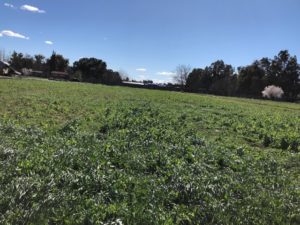
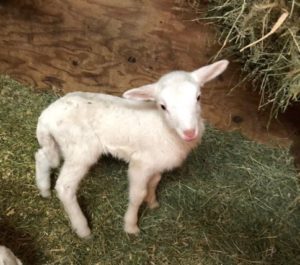
A couple weeks ago I had a great visit with Denise and Ben Lyons at their Lockewood Acres Farm in Vacaville. As a part of our work on the Solano Local Food System, I am getting to know local small farmers who are doing things right: they take care of the soil on their farms, plant diversified crop, pay special attention to the health of their water, strive for low-input farming (producing most of the fertility on the farm), and as a rule, look to work with nature, not against it, in harmonious, healing relationships with land, all living things and their communities.
Denise and Ben Lyons are this type of sustainable farmers. Their 10-acre beautiful, certified organic farm is located in the agricultural area between Vacaville and Dixon. When I came on a breezy & chilly February morning, both farmers were outside: Ben was fixing things around the barn, and Denise was wrapping up a meeting with Solano farmbudsman, Sarah Hawkins, going over rules and regulations governing various aspects of the farms’ operation. Even a small farm is a serious business, with its hard labor in the fields, barns and orchard, and different, but equally demanding work behind the scene: marketing, accounting, legal compliance, reporting… The work is endless and most of it is unseen by the community that gets to enjoy the fruits of this hard labor.
Most of the fields were resting for winter, covered by a green blanket of cover crop – fava beans, peas and other nitrogen-fixers. Before these plants go to seed, Ben will work this green manure into the fields, enriching and nurturing the soil, increasing its organic matter and improving water retention. This healthy soil will then feed the plants growing there that will eventually find their way to our kitchens and tables: tomatoes, cucumbers, eggplants, peppers, watermelons, salad greens, squashes, culinary herbs, and all sorts of root vegetables.
Fruit trees in the nearby orchard were also resting, waiting for the time when the sap will begin to flow, followed by beautiful fragrant flowers and then fruits. Apples, pears, all sorts of citrus, persimmons, plums, cherries, pomegranates, and figs – the list goes on and on of the bounty produced in this well-designed orchard. Olives are pressed in small batches in a local olive press – you can buy this olive oil directly from the farm.
Countless chickens were roaming the orchard, scratching the soil and adding natural fertilizers everywhere they went. Careful selection of heritage breeds provides for nutritious eggs in all possible colors: dark brown, light brown, blue, green, white.
In the small barns, there were dairy goats and hard-working sheep that regularly provide grass mowing services in the orchard, surrounded by adorable little ones constantly looking for milk and warmth. Keeping animals on the farm ensures a reliable source of manure, the traditional foundation of soil fertility, that decreases the demand for the outside input and supports this vibrant ecosystem called “Lockewood Acres Farm”.
An apiary completes the picture of the farm. Raw, delicious honey is available for sale year around.
Denise and Ben’ journey to this farm started with a discovery of the benefits of earthworms. Their original vision was to develop a homestead to nourish the immediate family. The vision eventually grew to include feeding the community! After the initial skepticism (mostly from Ben), the couple turned to organic farming, which Ben now describes as a “common-sense approach to farming”.
Would you like to join the community of the Lockewood Acres Farm well-nourished customers? This is what the Community Supported Agriculture stands for! Sign up to become a member of this farm’s CSA program. For more details, click here. If you are at the Vacaville Farmers Market on Saturdays, stop by the Lockewood Acres Farm stand and please say hi from their friends at Sustainable Solano!
There are multiple ways to participate and the farmers are flexible to work with you and your budget to provide nutrient dense, wholesome food for you and your family!
Feb 1, 2018
“The Juice House Co. Improving Health Through The Power of Food Energy”
By: Tiana Duvauchelle, Owner
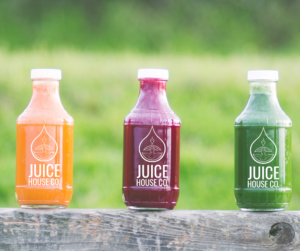
The Juice House Co. believes in the pursuit of positively impacting lives through the power of food energy. Together as a community, we unite as healthy beings through our offerings of Fresh, Raw, Organic Cold-Pressed Juice, Kombucha, Nut Mylks and Cold Brew Coffee.
I have shared my love of yoga at Yoga House Co. and to communities around the East Bay since 2012 and continue to, but in 2016 my sweet sister and I felt like we had more to give, more to share and more to offer to our local community; the dimension of FOOD YOGA. The journey of yoga begins with the physical body. The physical body “our food body” needs to be nourished. This body, consists of a material body built from the food we eat. With that as our forefront, we must feed our bodies with the most purest form of energy; organic fruits, veggies, nuts and grains. We built the Juice House Co. as a medium of offering food in its most purest form through my creative expression of love and devotion to all being everywhere.
Deep down, we all have the desire to eat healthy and be healthy, but we also live lives where we eat compulsively, away from home and so convenience it key. The Juice House Co. is here to offers this new flavor, with this new take on healthy indulgences
We work closely with our local, organic suppliers to create the best product with the best ingredients for our all favorite juice junkies. We strive to minimize waste through recycling/reusing bottles, to sharing our leftover compost with local growers, to upcycling our coffee grounds!
All Juice, Kombucha, Nut Mylks & Cold Brewed Coffee are locally sourced, pressed, bottled, and enjoyed! The Juice House Co. team is excited to share this food energy, this food yoga, one of the greatest wonders of life, pure raw energy given to us by Mother Earth.
Find us on First Street in Benicia for our fresh goods, friendly staff, great jams, good vibes and loving spirits….or order your goods online for pick up!
Feb 1, 2018
by Stephanie Oelsligle Jordan, Sustainable Solano, Local Food System Manager
This was my first EcoFarm conference. When initially sifting through the options for lectures and discussions about a month ago, I noticed the obvious: “how-to” workshops on various technicalities of farming, and peer discussions on what works (or doesn’t) in agriculture today, new inventions, pest management, etc. What I wasn’t expecting were some amazing and relevant discussions and speeches addressing how today’s farmers must intersect with larger social/world issues including hunger, social justice in food systems, honoring Native American lands, and climate change, just to name a few.
But there was another underlying, somewhat spiritual theme that seemed to arise from the workshops and discussions that I attended: our relationship to – and responsibility for – a given place, whether we farm it or not. It was this “sense of place” that I found myself thinking about the most, and how that idea might serve my work with Sustainable Solano’s Local Food initiatives.
I am not an expert in Permaculture or Biodynamic farming (I’m a chef!) but I gathered that this “sense of place” is vitally important in both methods of farming. In a talk titled “Nature Connection, Permaculture & Ecological Responsibility,” Will Scott of Sonoma’s Weaving Earth Center for Relational Education took us on a journey both inside our minds and hearts, and then – literally – out into the woods. His initial argument was that “our sense of awareness of our landscape and surroundings has been limited by the industrialized world….The mind has been colonized, and the story of separation has been ingrained….Modern experience has atrophied our ‘whole being sense.’” But all is not lost!
Through “Nature Connection,” we can regain our sense of connection. He made an interesting point (often forgotten, I might add) that our connection to the natural world just IS. We can’t deepen it. However, we can increase our capacity to interact with it and relate to it. “When love for a place happens,” he stated, “empathy is embodied and behavior can change to ensure the place is taken care of….If we want to start designing or thinking ‘whole system’, then we need to use our whole system too: heart and mind, and not just our intelligence.” He had a quote from someone else, which pretty much summed it up: “Lose your mind and come back to your senses!” So we did. He led us out to the woods, and for about 10 minutes we did nothing but let nature interact with our 5 senses, in what he called a “Sit Spot.”
Another workshop that touched upon this “sense of place” was a discussion group titled “Biodynamic Farming and Gardening for the Future”. Seasoned biodynamic farmers and newcomers to the method were sitting in a circle, and I was struck by one farmer who had previously farmed in Wisconsin. He had lately moved to California, and just wasn’t connecting to the land like he had in the Midwest. (This is a problem, by the way, if you want to be a biodynamic farmer!) As I learned about the importance of the farmer’s interaction with not only the land, but also the solar system, weather patterns, creatures big and small, and everything else in his/her “place,” I began to wonder about the rest of us. Is there a way to connect non-farmers to the land/place through the food?
This question also came up for me at a couple of workshops on Community Supported Agriculture (CSA) programs. As you’d guess, the CSA discussions were largely about how to acquire and retain subscriptions. After addressing the logistical issues (marketing, surveys, packaging, software, etc.), the group concluded that 1) education about CSAs was important and 2) people want a connection to local farmers. Here’s that connection theme again!
The final talk I attended was titled “The Farmer and the Chef: Utilizing Abundance” (Finally! Something I understand!) and featured exactly that: Farmer Jeff Dawson of The Farm in Woodside, CA and Chef Stuart Brioza of State Bird Provisions and The Progress restaurants in San Francisco. Here they were, presenting their collaboration, along with all the spreadsheets and systems that have made it work over the past 5 years. This is admittedly a very specialized relationship, in which the majority of us will not experience. However, Chef Brioza made a good point, which is not unlike the CSA programs, and has this idea of connection at heart: “You’re not just partnering with a farm. You’re partnering with abundance, and the harvest….We are telling a story about the farm, on the plate.”
I’m sure I left EcoFarm with more questions than answers. (How can the larger population become involved in that “sense of place” in order to appreciate the value of the farmer’s work? How can this “sense of place” influence our local farmers to take better care of their soil? How are we ALL responsible for this place, whether we farm it or not?) And I think most of the attendees may have left with more questions as well. However, I sensed an energy among all of us that in the midst of all the questions, we all had an unwritten and unspoken commitment to one another to move forward. Everyone seemed courageous….ready to make connections….and do what it takes to care for their respective places on the planet.
Made possible by Solano Public Health in partnership with the Yocha Dehe Wintun Nation
Oct 4, 2017
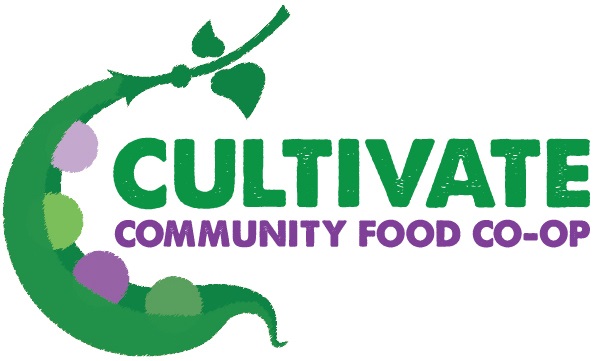
By Cultivate Community Food Cooperative
The experts say it will take a startup food co-op about 3-5 yrs. to open a food co-op grocery store. Well if that is true, then Cultivate Community Food Co-op is right on course. After 18 months of Stage I development – Organizing, CCFC reached Stage II development – Feasibility and Planning, in July, when we filed our Articles of Incorporation.
In September we had an Incorporation party and sold 25 owner shares, (soon we will be selling owner shares online.) Which brings us to October, which just happens to be ‘Co-op month’. Co-op month has been celebrated annually in October across the United States for more than half a century. It is a time for cooperative businesses to reflect on their shared principles and to educate others about the value of belonging to a cooperative.
In doing our part, Cultivate Community Food Co-op will be joining Sustainable Solano in a panel discussion entitled, ‘How to Make the World Better’, on Wed. Oct. 25 at the Heritage Presbyterian Church in Benicia. CCFC’s founder, Paula Schnese, will share with the community the progress the food co-op has made, talk about our future goals and timelines, and answer questions from the audience. In addition to this educational event, during Co-op month, CCFC will
also be sharing information at some of the local farmers markets and at the Loma Vista Farm Harvest Festival on October 21st .
Become an owner of your local food co-op! We will be selling owner shares at all the events we attend! ��
Our Collective Goals
To create a sustainable grocery business based on member ownership and democratic decision-making
To support local producers and sustainable agriculture
To provide health-enhancing foods
To keep prices as low as possible
To be fair and supportive to our employees and to be sensitive to the working and living
conditions of those who make what we sell
To be a community resource that helps the people of Benicia and Vallejo lead healthier lives
To be a place in the community where people can come to gather and create community
To be good stewards of the environment through conscientious, sustainable use of resources
To reach out to low-income members of the community and enable their participation.
To welcome all.
Our Mission
Cultivate Community Food Co-op will be Solano County’s first community-owned, natural grocery store. We will be a one stop, brick and mortar grocer dedicated to providing high-quality, locally-sourced, culturally-relevant, ethically-produced and affordable products.
Offering health and wellness education, we aim to empower our community and provide a public meeting space to engage with others. We are committed to creating and maintaining a more sustainable economy with a just and equitable future for our farmers, artisans, employees and owners by decreasing the physical and social distance between producers and consumers.
Cultivate Community Food Cooperative, Inc. (CCFC) is a cooperative corporation organized under the Consumer Cooperative Corporation Law of California
Become an Owner of CCFC: Owners in good standing may vote in co-op elections, attend the Annual Meeting, and run for the Board of Directors.
Other benefits include:
Coupons, Sales and Discount Days
Case Discounts on Special Orders
Patronage Refund
Discounted Classes
Select a Plan: Online sales will be available on our website soon
Full Fair Share*: Invest $300
Strongly encouraged to facilitate store opening
Partial Share*: Invest $25
Now and every quarter (or more often) until the full Fair Share of $300 is reached
*A $5 processing fee is charged (this helps with the cost of creating membership cards)
Contact Us:
E-mail: info@cultivatecommunityfood.coop
Website: http://cultivatecommunityfood.coop/
Facebook Page: https://www.facebook.com/cultivatecommunityfood.coop/
Mailing address: P.O. Box 94, Benicia, CA 94510


 Sustainable Solano is nearing completion of Phase 1 of its “Solano Community Food Centers” project, funded by a USDA Local Food Promotion Program planning grant. The Food Centers are intended to be small-scale, consumer-driven food hubs (including both processed food and raw ingredients), sourced by local farmers, and located in each of Solano County’s seven cities.
Sustainable Solano is nearing completion of Phase 1 of its “Solano Community Food Centers” project, funded by a USDA Local Food Promotion Program planning grant. The Food Centers are intended to be small-scale, consumer-driven food hubs (including both processed food and raw ingredients), sourced by local farmers, and located in each of Solano County’s seven cities.



